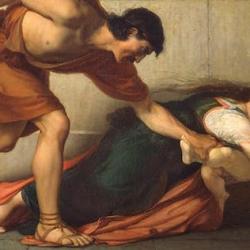The church’s stance with regard to civil order is neatly articulated in Romans, provided we read chapters 12-13 together.
Romans 13 makes it clear that God has given rulers the sword, and that they are to use it for just vengeance. They bear the sword to punish evildoers and to advance the good. Some men and women are authorized to use the sword, ultimately by God. Because they are authorized by God, they are responsible to carry out His vengeance as His “deacons.” That means doing acts of justice, sometimes forceful justice, as an intervention of God’s wrath. If this is a good work, part of the manifestation of God’s justice and redemption in the world, then it is a work that Christians may do.
But Romans 13 comes on the heels of Romans 12, which describes, in terms reminiscent of the Sermon on the Mount, the way of the church. James Rogers has recently pointed out that Romans 13 is as focused on Christian behavior as Romans 12. In the immediate context, the point is that Christians must refuse to take vengeance into their own hands, leaving it to God to avenge them, which sometimes happens through the sword of the civil ruler. Rogers notes that Paul doesn’t back away from Jesus’ prohibition of vengeance; he “doubles down” on it, warning that Christians themselves will face the wrath of God’s avenger if they attempt to usurp God’s authority to avenge.
Beyond that immediate context, the passage highlights the difference between the polity of the church and the political tools of other polities. Whether in church or in society, Christians are to refuse vengeance; but the civil order does have weapons that the church does not. Civil weapons aren’t, however, the most potent ones. The church has all the really sophisticated weaponry. The church is the eschatological society, and so, though she endorses and honors the civil order of this age, she is not a society of this age. She is the society of the age to come, and so operates entirely by the spiritual weapons that are powerful for bringing down the fortresses of the powers of this age.
She affects the politics of this age by exposing their deficiencies and inadequacies, by demonstrating the limits of law and force. She reminds political authorities that their systems, however just, are not carriers of the justice of the age to come. She also affects the polities of this age by her advocacy of true justice and her hostility to violence in all its forms. She urges moderation of the severity of law in some circumstances, as Augustine wrote to Macedonius (Letter 153). She may, in some circumstances, be given the authority to review penal cases. (Code of Justinian, 1.4.22: “the Bishops in each place shall have authority to inspect the prisoners. . . [and] should report any negligence they observe of the part of . . . the Governors . . . in order that appropriate disciplinary steps may be taken against those guilty of any negligence.”) She doesn’t expect rulers to lay down the sword as such, though she may castigate rulers for specific uses of the sword.
Today, some Christians are skeptical about all uses of force. But it doesn’t seem possible, or ethical, to hold this position consistently. Impossible: Because any form of physical coercion, no matter how restrained, can be construed as an act of violence. We have to have categories that distinguish ethically between a mugger and someone who disables a mugger. Unethical: Because restraint of violence by force is necessary to protect the weak, and also because, whether we like it or not, we are beneficiaries of the forceful acts of soldiers, police, and other law enforcement personnel. Absolutists are willing to enjoy the benefits of what they call “violence” but are too pure to dirty their own hands.
As is often the case, a resort to Paul will sort it out.















